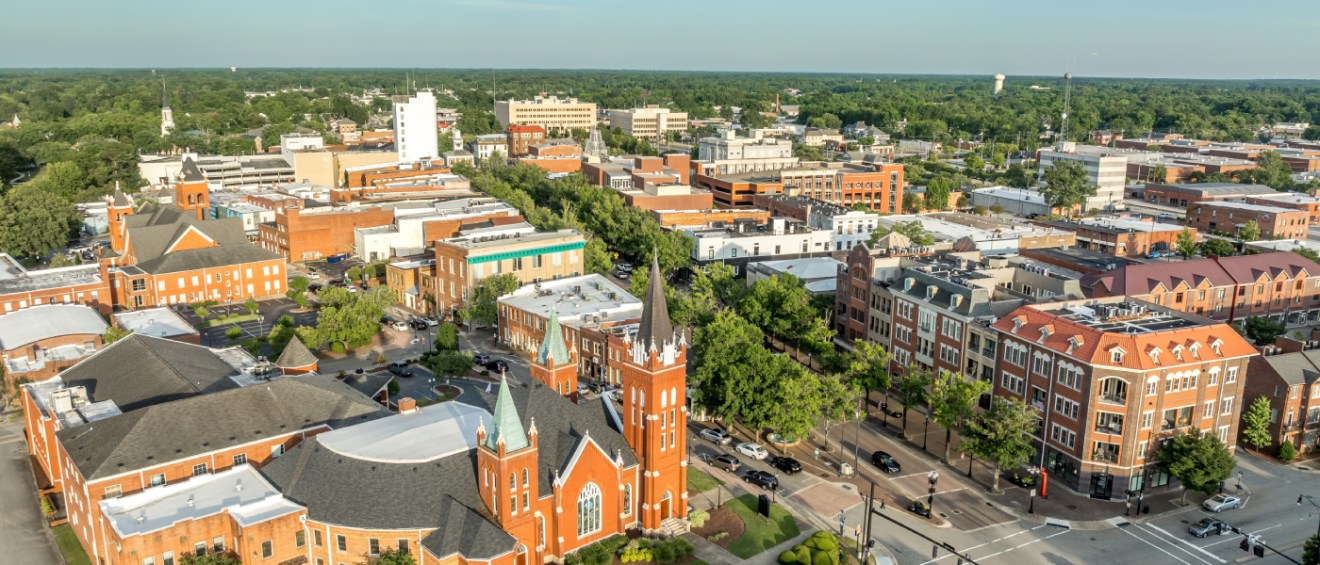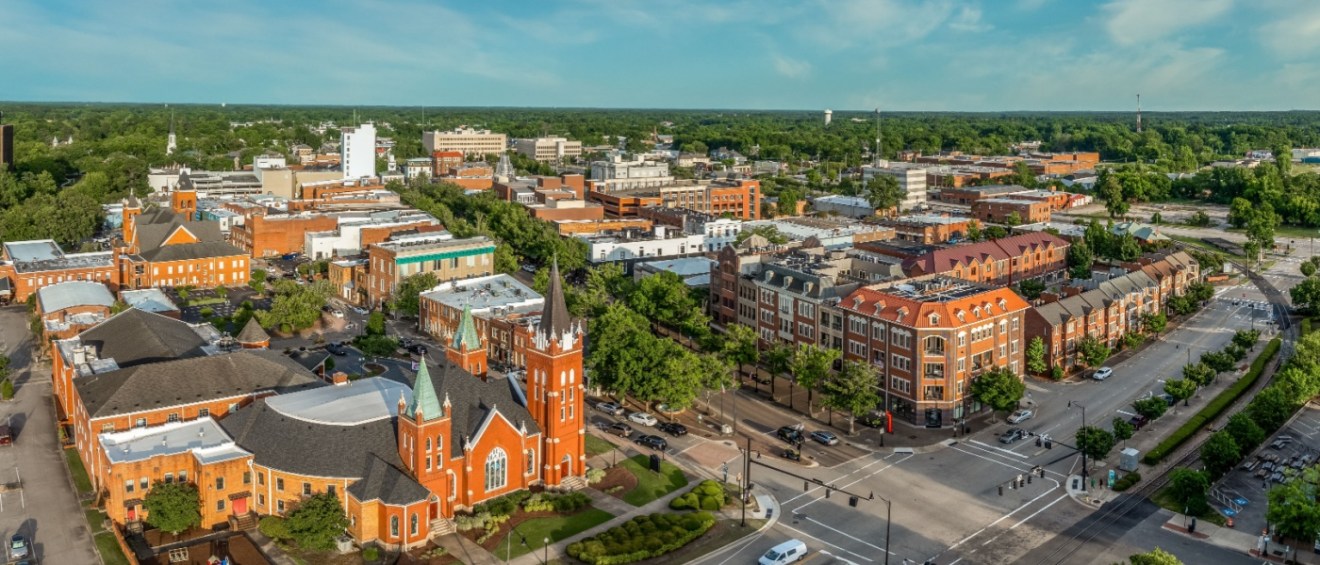Cost of living in Fayetteville, NC: What to expect when living here as a renter
Share this article:
Tucked into eastern North Carolina, Fayetteville combines Southern character with a growing economy and a welcoming community. Renters are drawn here for its convenience, culture, and affordability.
But before you rent your happy place, it’s worth understanding the cost of living in Fayetteville, NC. Knowing how much you’ll spend on rent, groceries, and other essentials helps you plan realistically and settle in with confidence.
Living in Fayetteville means enjoying both comfort and value. With costs that often fall below the state and national averages, the average cost of living in Fayetteville, NC, gives renters a chance to enjoy a balanced lifestyle without overspending. By taking the time to compare the cost of living here to other cities, you’ll see why Fayetteville continues to attract renters looking for affordability, convenience, and a sense of home.
What is the average cost of living in Fayetteville, NC?
Renting in Fayetteville, NC, offers a lifestyle that combines affordability with easy access to major employers, shopping, and outdoor recreation. The average cost of living in Fayetteville, NC, makes it one of the most budget-friendly cities in the state. For renters, this is appealing, especially if they want a comfortable lifestyle without stretching their paychecks too far.
While some expenses are slightly higher, others fall well below the national level, giving renters a balanced financial picture:
- Housing: 18% lower than the North Carolina average and 29% lower than the national average.
- Utilities: 1% lower than the state average and 3% lower than the national average.
- Food: 5% lower than both the state and national averages.
- Healthcare: 2% higher than the state average and 6% higher than the national average.
- Transportation: 3% higher than the state average but 2% lower than the national average.
- Goods & services: 4% lower than the state average and 9% higher than the national average.
Housing stands out as Fayetteville’s most affordable category, while utilities and groceries stay slightly below national costs. You’ll have to spend more on healthcare and personal services, on the other hand, as there are small premiums in those areas.
Overall, the average cost of living in Fayetteville, NC, offers renters a meaningful financial advantage, especially when it comes to finding affordable housing and managing day-to-day expenses.
Breaking down the cost of living in Fayetteville, NC
To better compare the cost of living across different expenses, here’s a closer look at how much the essentials typically cost for residents in Fayetteville.
Housing (buy and rent)
- Average monthly rent: $1,276
- Average home price: $374,021
Renters in Fayetteville enjoy some of the most affordable housing prices in the region, making it easier to find apartments that fit various budgets and lifestyles.
Utilities
Whether you rent or own, utility expenses are part of daily life. In Fayetteville, common monthly costs include:
- Energy bills: $210.60 per month
- Phone bills: $170.30 per month
These numbers reflect modest utility costs compared to larger metropolitan areas, adding to the city’s affordability appeal.
Food
Food costs play a big role in any household budget. In Fayetteville, prices for basic groceries tend to be below the national average:
- Milk (1 gallon): $4.30
- Eggs (dozen): $2.71
- Bread: $2.04
- Potatoes: $4.68
- Cheese: $4.58
- Ground beef: $6.57
This makes Fayetteville a solid choice for renters who want to enjoy home-cooked meals without overspending.
Healthcare
Medical expenses are an essential consideration when analyzing the cost of living in Fayetteville, NC. Here are some common appointment prices:
- Doctor’s visit: $136.62
- Dentist: $137.40
- Optometrist: $142.20
While healthcare costs run slightly higher than the national average, Fayetteville offers a strong network of healthcare providers, including both general practitioners and specialized clinics.
Transportation
Getting around Fayetteville is relatively straightforward, whether by car or public transportation. Here’s what to expect for typical vehicle-related costs:
- Gasoline (1 gallon): $3.29
- Tire balancing: $60.50
Transportation prices are in line with national norms, helping residents keep commuting and travel expenses manageable.
Goods & services
Fayetteville’s retail and personal service costs vary by category, but here’s a snapshot of what locals pay for common goods and services:
- Men’s shirt: $42.23
- Women’s slacks: $24.23
- Boy’s jeans: $17.86
- Haircut: $36.60
- Beauty salon: $45.42
- Dry cleaning: $14.42
- Movie ticket: $13.48
While clothing and entertainment run slightly higher than average, these differences are balanced out by Fayetteville’s lower housing and food costs.

Is Fayetteville, NC, a good choice for renters?
Fayetteville gives renters the chance to stretch their budgets without sacrificing quality of life. The average cost of living in Fayetteville, NC, is lower than both the state and national averages, thanks to affordable housing and reasonable utility costs. While healthcare and personal services run a bit higher, most daily expenses stay well within reach.
For those looking for value, convenience, and community, Fayetteville checks all the boxes. When you compare the cost of living in Fayetteville, NC, to other cities, it’s easy to see why so many renters choose this area for its balance of affordability, accessibility, and Southern charm.
Share this article:
Florin Petrut is a real estate writer and research analyst with RentCafe, using his experience as a social media specialist and love for storytelling to create insightful reports and studies on the rental market. With a strong interest in the renter experience, he develops data-driven resources that explore cost of living, affordable neighborhoods, and housing trends, helping renters make informed decisions about where and how they live. Florin holds a B.A. in Journalism and an M.A. in Digital Media and Game Studies.
The Ready Renter has your back
Tips, news, and research curated for renters, straight to your inbox.




Related posts
Subscribe to
The Ready Renter newsletter






